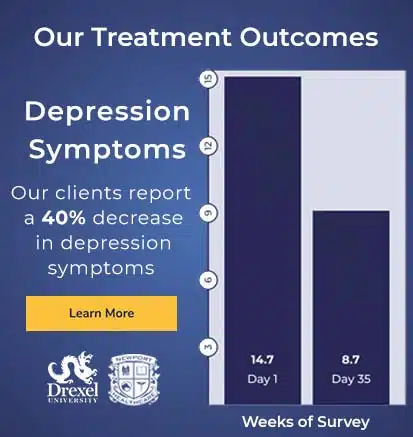Witnessing a teen’s struggle with depression is heartbreaking. Parents often feel hopeless and helpless. But teen depression treatment can be transformative for an adolescent and their family, bringing light back into their lives. Newport Academy offers care at our depression treatment centers across the country.
New research shows that depression in teens has doubled since 2019, with one in every four teens experiencing depressive symptoms. Without treatment, depression can escalate into suicidal behavior and attempts. Teens with depression need effective, evidence-based care and the support of loved ones in order to find their way back to thriving.
How to Help a Teen with Depression
Parenting is hard, and parenting a teen with depression is even harder. It can feel nearly impossible for family members to reach a teen who has withdrawn into their room and refuses to talk about their depressive thoughts and feelings. And, unfortunately, there is no specific formula for how to parent a teenager with depression, because every child is unique.
However, there are therapist-approved approaches for how to deal with a depressed child, such as offering unconditional love and practicing self-care by attending parent support groups. Of course, being able to recognize the signs and symptoms of depression and access teen depression treatment is paramount. Ignoring the problem or trusting it will go away on its own will only increase the risk of a major depressive episode or even a teen suicide attempt.
Maintaining ongoing communication with your child is also essential. Even when teens don’t want to listen or open up, parents need to keep finding ways to connect, talk to their children about what they’re going through, and let them know that they are not alone and there is hope.
How to Explain Depression to Your Child
Depressed teens typically don’t fully understand why they feel the way they do. They often believe they’re the only one struggling, while all their peers are doing fine. And even though they want to feel better, they may be frightened by the idea of entering a teen depression treatment center. They might have heard about rehab for teenage depression but don’t know what that means.
Parents and other family members can help by providing clear and honest information about depression itself and about teenage depression treatment. Here are some important facts and assurances that teens with depression need to hear:
- You are not alone: Depression in teens is very common. According to the latest statistics from Mental Health America, 15 percent of teens in the United States have had at least one major depressive episode in the past year, and 10 percent have severe depression. Globally, 25 percent of teens suffer from depressive disorders.
- There is hope: Teenage depression treatment is highly effective, and the earlier a teenager receives treatment, the more likely they are to experience long-term recovery. Knowing this fact can help motivate a teen with depression to willingly engage in treatment.
- Treatment isn’t just about talking: There are various types of treatment for depression, including experiential therapy and somatic (body-based) modalities. This can be particularly reassuring for teens who have a hard time expressing their emotions and experiences verbally.
- We are here for you: Parents need to assure their children that they can always come to them when they are struggling. Even if the parent-child relationship is not perfect (and no relationship is), teens need to know they can safely turn to their parents for support.
In addition to these points, parents can talk openly with their children about how the family will move forward in getting the help they need. A comprehensive assessment by a mental health professional is the first step in finding the teenage depression treatment center that will best fit an adolescent’s specific needs and their individual and family history. A trained clinician will assess your teen’s depression symptoms using criteria established by the Diagnostic and Statistical Manual of Mental Disorders.
More About Depression
More About Depression
Types of Treatment for Depression
Once parents begin to research depressive disorders and teenage depression treatment, they quickly realize there are different levels of care and types of treatment for depression. The kind of treatment that will be most successful for an adolescent depends on the type and severity of their depressive thoughts and feelings.
Different types of treatment for depression include:
- In-person or online talk therapy for teenage depression, once a week or more often
- Depression medication for teens
- Hospitalization, typically for very short-term stays following a mental health crisis
- Outpatient treatment centers for teens with depression, providing full-day or after-school depression programs
- Residential care at a teen depression center away from home
- Rehab for teenage depression—the term rehab is often used to indicate that a teen depression center also treats substance abuse as a co-occurring disorder associated with depression.
Residential Care for Teen Depression
The most effective way to treat adolescent depression is often residential treatment. Long-term treatment (at least 30 days) in a teen depression center provides sufficient time to address the underlying causes of a teen’s mental health struggles, such as childhood trauma, attachment wounds, and/or low self-esteem. Furthermore, teens have the opportunity to practice healthy coping skills and build trusting peer relationships within a caring and supportive environment.
Adolescent residential treatment centers for depression should always utilize an evidence-based approach. That means that the methodology and modalities used to treat adolescents are scientifically validated. In other words, multiple studies over time have proven these approaches to be effective in treating depression in teens. Moreover, therapy for teenage depression should always be facilitated by trained and licensed clinicians who bring to their work a passion for supporting adolescents to find their true selves and achieve sustainable healing.
Benefits for Teens Receiving Depression Treatment
Teen depression treatment has both long- and short-term benefits. Most pressing, it can literally save the life of a teen with depression. Moreover therapy for teenage depression goes beyond what antidepressant medications can do: It empowers adolescents with new self-knowledge and tools for healthy living. What teens gain in treatment will support them to maintain recovery while successfully navigating the many changes and stressors associated with this stage of life. In addition, all family members benefit from treatment that rebuilds parent-child bonds and restores family communication and harmony.
Short-Term Benefits of Teenage Depression Treatment
- Enhanced interest in activities and social connections
- More energy and greater ability to relax and rest
- Improved concentration
- Better sleep and appetite
- Fewer feelings of worthlessness
- Significant reduction in suicidal thoughts and behaviors
Long-Term Benefits of Therapy for Teen Depression
- Stronger emotional regulation and executive functioning skills
- Skills for building authentic, trusting connections with self, peers, family, and their larger community
- A heightened sense of purpose that motivates increased engagement in academics and career planning
- Greater trust and support within the parent-child relationship
- Enhanced resilience and self-compassion
- Healthy coping and self-care skills that will serve them for the rest of their lives
Insurances We Work With
We work with most major insurance companies, including both In-Network and out-of-network payers, to optimize access to care for families.










Treating Depression in Teenagers at Newport Academy
Newport Academy’s clinical model for treating depression in teenagers incorporates family involvement, an integrated team approach, and a wide range of modalities, including Attachment-Based Family Therapy, Cognitive Behavioral Therapy, Motivational Interviewing, and experiential therapies. In treating depression, we take into account multiple levels of a teen’s well-being—emotional, relational, physical, psychological, and educational. Our behavioral and medical professionals guide adolescents in processing underlying trauma and repairing ruptures in the parent-child relationship. At the same time, teens gain powerful, practical skills that improve their emotional regulation and distress tolerance.
Over the past 12-plus years, this multifaceted approach has proven to be successful in healing depression in teens, as well as co-occurring disorders arising from teen depression. Consequently, despite the increasing acuity of teen depression diagnoses, Newport Academy’s treatment continues to yield industry-leading outcomes.

Evidence-Based Therapy for Teen Depression
Our integrated approach to teenage depression treatment addresses the underlying trauma and attachment wounds that increase the risk of depression and co-occurring disorders, such as substance abuse, eating disorders, and self-harm. We partner with a third-party academic institution, Drexel University’s Center for Family Intervention Science, to measure and publish our treatment outcomes, which consistently validate the success of our teen depression treatment for teens.
The foundation of our depression programming is our team of compassionate and highly experienced behavioral healthcare professionals. The Newport Academy team is comprised of the best mental health leaders in the country, including psychiatrists, family and individual therapists, medical professionals, counselors, experiential therapists, and more—surrounding each client with 360-degree care.
—Barbara Nosal, PhD, LMFT, LADC, Newport’s Chief Clinical Officer“Our staff is passionate, dedicated, and willing to do whatever it takes to succeed, with every child who comes through our doors.”
Levels of Care Offered
To meet each teen and family where they are in the journey of healing from depression, Newport Academy offers a full continuum of care at locations around the United States. Our care includes residential programming as well as various outpatient treatment options. After treatment, our Continuing Care program provides support for both clients and families. In addition, our robust Alumni Programming keeps teens connected to their peers and to a network of caring professionals, through get-togethers and support groups.

Teen Residential Treatment
Research finds that residential care provides the support, structure, and caring community that teens need to heal from depression. Each adolescent’s individualized residential treatment plan incorporates clinical, experiential, and academic elements to address the underlying causes of teen depression.

Partial Hospitalization Program
This PHP level of care offers programming all day, five days a week, for teens who need more than weekly therapy but who do not qualify for a residential level of care. A PHP offers comprehensive clinical care and a stabilizing routine, and teens return home to their families at the end of each day.

Intensive Outpatient Program
For clients who are continuing to attend school during the day, an IOP with afternoon hours provides teen depression treatment throughout the week, with regular check-ins and support groups for the entire family. With Outpatient Services, teens attend the program fewer than five days a week, as needed.
A Typical Teenage Depression Treatment Plan
Each client at Newport Academy receives a tailored treatment plan for teenage depression, designed by a team of medical and clinical experts in response to the teen’s and family’s specific needs and history. Comprehensive psychological assessments also inform each client’s customized treatment plan. Each teen’s daily schedule while in teen depression treatment includes a variety of evidence-based clinical, experiential, and academic modalities. Services may vary depending on treatment location.
Clinical Modalities
- Cognitive Behavioral Therapy
- Family therapy using Attachment-Based Family Therapy
- Emotional Freedom Technique
- EMDR (Eye Movement Desensitization and Reprocessing)
- Acceptance and Commitment Therapy
Experiential Modalities
- Yoga and mindfulness exercises
- Music and art therapy
- Mixed martial arts and fitness activities
- Equine-Assisted Therapy
- Adventure Therapy
- Healthy device management
- Community service
What Sets Our Teen Depression Treatment Center Apart
Along with the wide range of modalities we offer, Newport Academy’s clinical model incorporates specific components that are unique to our program. These foundational aspects of our philosophy of care result in exceptional success rates in treating depression in teenagers as well as reducing the risk of suicide. We also treat teen mental health conditions such as bipolar disorder, anxiety, and trauma, and co-occurring issues including substance use disorder, disordered eating, and self-harm.
Our Family-Focused Approach
Newport Academy’s teen depression treatment views family as the key to long-term, sustainable healing. This secure foundation of support is critical to adolescents’ well-being and lowers the risk of depression recurrence following treatment. Consequently, we are the only depression treatment program to make the groundbreaking Attachment-Based Family Therapy (ABFT) methodology a central component of our mental healthcare approach. ABFT is proven to be successful in addressing teen depression and teen suicide risk by repairing ruptures in the parent-child relationship, so teens feel safe going to their parents for support.
Learning as Part of Healing
Our focus on academics is another aspect of our depression treatment for teens that sets us apart. Unlike other treatment centers for teens with depression, Newport Academy views academics as part of our treatment model. Our strengths-based approach taps into each adolescent’s particular passions and talents. As teens’ well-being increases, their motivation and excitement about learning increase as well. The result is that teens not only stay on track with their education but also experience academic engagement and progress—in some cases for the first time.
How to Motivate a Teenager with Depression to Enter Treatment
When researching teen depression and treatment, the first question parents ask is “How do I help my daughter with depression?” or “How do I help my son with depression?” Once they understand the options for teen depression treatment, their next questions are often about how to motivate a teenager with depression to enter treatment.
Hearing stories from alumni about their life-changing experiences in teenage depression treatment can be extremely motivating for teens. Taking a tour of a treatment program can also be reassuring. However, it’s important for parents to know that even adolescents who are resistant to therapy for teen depression will benefit from it. Data on our outcomes shows that, within a very short period of time, even clients who didn’t think they needed treatment when they arrived are already experiencing marked improvement. They quickly develop strong bonds with their therapists, feel more hopeful and excited about life, and report significant reductions in depression symptoms.
“While starting teen depression treatment may be a difficult choice for parents to make when their child is resistant, our research on Newport’s outcomes shows that it is unequivocally the right choice.”
—Guy Diamond, PhD, Drexel University researcher and founder of AB
Our Locations
Newport’s teen depression programs are located nationwide. Our residential and outpatient locations feature on-site gardens, art and music studios, gyms, peaceful spaces for yoga and meditation, and academic classrooms and Learning Labs outfitted with the latest technology. At Newport Academy, we understand the importance of the treatment environment in the healing process. Therefore, our locations are in serene and beautiful settings and feature comfortable, home-like living spaces.
We provide therapy for teenage depression in states including California, Connecticut, Georgia, Maryland, Minnesota, Pennsylvania, Texas, Utah, Virginia, Washington, and Wisconsin. To reach as many adolescents and families as possible, we’re continually expanding, with a focus on areas where there are a limited number of treatment centers for teens with depression.
Our Accreditations
Newport holds the Gold Seal of Approval® from The Joint Commission, the nation’s oldest and largest healthcare accrediting body, and is affiliated with a wide range of national organizations and certification bodies.
Additional Teen Depression Resources
To support parents and professionals, our extensive library of resources and teen depression articles provide a wide variety of information on adolescent depression and other mental health topics. Explore the latest research on depression in teens, find tips for how to help a teen with depression, and read Q&As with our clinical experts and thought leaders.

How to Recognize Smiling Depression in Teens
Smiling depression is a form of depression in which a teen appears to be happy and even thriving on the outside, while suffering on the inside.
Is It Teenage Angst or Depression?
Given the ups and downs of teenage emotions, it can be hard for a parent to tell the difference between typical teen mood swings vs. the warning signs of depression.
Situational Depression: The Basics Parents Should Know
Situational depression in teens arises from a clear and identifiable stressor that overrides their ability to cope—and some adolescents are particularly vulnerable.













